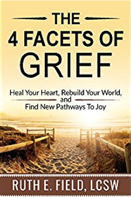 Have you seen the Tony Award-winning musical Hamilton? After purchasing tickets last March, I was very excited yesterday when it was finally “my shot” to enjoy the Chicago production of this ground-braking play. I was prepared to be blown away by the music and lyrics, having familiarized myself with much of it ahead of time. And I knew it was the story of (obviously) America’s founding father, Alexander Hamilton. I even remembered he was killed in a duel with Aaron Burr and wondered how that would be portrayed on stage. But I was not familiar with any details of Hamilton’s personal life. I don’t believe the history books I read in my youth contained any such specifics, nor was I ever curious enough to seek that information on my own. So there I sat in the darkened theater, watching intently as (Spoiler Alert for those who haven’t seen it) Alexander and wife Eliza’s young adult son Phillip was suddenly killed. I was unexpectedly transported back to my own son’s sudden death in 2011. I heard the word “unimaginable” repeated in the lyrics over and over, but I’m not sure if that was only in my mind. The unspeakable agony of losing a son played out in colorful, powerful, swirling intensity before me and inside me. I quietly held myself together in public. In the closing moments of the play, the audience learns Eliza Hamilton went on (after Alexander’s death) to found the first private orphanage in New York. Her face is illuminated as she smiles and offers a brief delighted gasp, and the company sings “Who lives; who dies; who tells your story.” This ending is open to individual interpretation and has been the subject of much speculation over the years. As a fellow bereaved mother, I know you never get over losing a child, no matter how many years eventually pass. So I took her gasp partly as joyful reunion with her husband and son at the end of her life, and also as recognition of the love she gave to all those orphaned children and the meaningful healing it provided in return. She tells not only her husband’s story, but her own as well. I left the theater with the closing refrain echoing in my brain. “Who lives; who dies; who tells your story.” My son David lived 26 years and now I’m telling not only his story, but mine too. It is my greatest hope that our stories will help you or someone you know. I believe with all my heart that grief resilience can be learned, and one strategy is by finding a personally meaningful focus that helps others. For more ideas on how to navigate grief, check out my book, The 4 Facets of Grief: Heal Your Heart, Rebuild Your World, and Find New Pathways to Joy. It’s now available on Amazon in Kindle, Audible, and Paperback editions. Click on the book cover to learn more: I’m always interested in your thoughts so feel free to reply to this post.
1 Comment
Laura
10/24/2017 05:22:07 am
Thank you for aharing this profound experience. It happens when we least expect it but at the moment when we are supposed to pay attention. You may have been the only person in that moment to have had such a reaction because of the experience you had to endure as a bereaved mother. Sharing that moment is a gift from you to all of us.
Reply
Your comment will be posted after it is approved.
Leave a Reply. |
Essays on Grief ResilienceArchives
December 2020
|